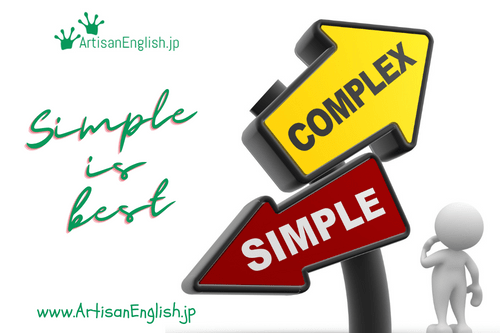
YouTube / iTunes / Spotify / Radio Public / Pocket Casts / Google Podcasts / Breaker / Overcast
Listen to ArtisanEnglish.jp posts & lesson intros here.
Expression: Simple is best
We’ll start the week with one of the simplest expressions in English – simple is best.
Now, you may think it’s only natural and makes total sense that simple things are the best, but as humans, we tend to spend the first half of our lives complicating things and then the second half trying to get back to basics.
As you may have guessed, the expression simple is best means it is better to keep things simple than it is to make them complicated.
The funny part is that most people spend half their lives learning this, while others never understand it.
Here in Japan, over the past ten years or so, there has been increased emphasis on the slow life movement.
Retired people from the big cities are moving into the countryside.
They do it because it took them 60 years to learn that simple is best.
Cities tend to be complicated, fast-paced, noisy places where no one knows your name.
In the more rural prefectures, life moves at a slower pace.
Empty homes are almost a dime a dozen.
In some small villages, you can get a house for free or for a very nominal fee.
How simple is that?
Where I live, we hear deer and monkeys calling at night.
You can go for a walk, meet someone, and have a 20-minute conversation about Chinese cabbage.
That’s what it means to be connected to both nature and humans.
You see, in life, simple is best.
Most of us learn that a little too late.
Hopefully, now that remote work is becoming acceptable, younger people will move to rural areas to learn that simple is best.
Flesch-Kincaid Readability Test
This post is understandable by someone with at least a 7th-grade education (age 12).
On the Flesch-Kincaid reading-ease test, this post scores 77.
The easier a passage is to read, the higher the score on a scale of 0 – 100.

